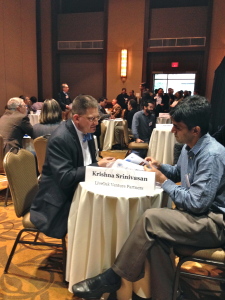By LAURA LOREK
Reporter with Silicon Hills News
 Getting a research grant from the federal government can seem like a big mysterious process to startup entrepreneurs.
Getting a research grant from the federal government can seem like a big mysterious process to startup entrepreneurs.
But last week, the federal government held its Fall SBIR/STTR Conference at the AT&T Executive Conference Center in Austin to make the grants more accessible to bootstrapped entrepreneurs. Several hundred people attended the event, which featured one on one meetings with federal program managers for Small Business Innovation Research grants.
“Our mission, in coming here and participating, was to see how federal resources for entrepreneurship, and for support and promotion and acceleration of investment, how best we can leverage these resources to make them available to people that have already bootstrapped remarkable efforts in creating innovation ecosystems,” said Robert Allen Baker, senior policy advisor for the SBIR program.
The Small Business Administration runs the SBIR program that awards $2.3 billion in research and development grants annually to small businesses. The Small Business Technology Transfer, known as STTR, is another program that awards grants to small businesses.
Austin is being considered for a regional pilot program through the Small Business Administration to study and foster innovation ecosystems, Baker said.
The Austin Chamber on Thursday held a summit at the conference, which brought together tech startups, venture capitalists and angel investors with the federal officials. Michele Skelding moderated a panel discussion on investing featuring Krishna Srinivasan with LiveOak Venture Partners, Chris Shonk with Austin Seed Ventures, Rick Timmins with the Central Texas Angel Network, Josh Baer with Capital Factory and Jeremy Mappus with Cubic Corp.
Even venture backed companies should be thinking of SBIR opportunities,” said Srinivasan with LiveOak.
“It feels like there is a ton more capital available,” he said.
Mappus, a game developer, received several SBIR grants to create total immersion training software for the military.
“We had some people we connected with who had experience in the government space and we brought someone in who had experience writing grants for SBIR,” Mappus said.
They received a grant to create squad based training to teach soldiers to run squad operations through simulated game play.
His advise to other startup companies is “don’t be afraid to do it. “
“This is a way to take money that you would otherwise have given up as equity to an investor and instead keep it in your pocket,” he said.
Timmins with CTAN said he planned to investigate and learn more about the grants.
“I think it behooves us all to understand this funding source for these companies,” he said.
The perception is that it’s hard to apply for the SBIR grants and there’s a lot of bureaucracy involved, said Josh Baer with Capital Factory.
The only companies he has seen take advantage of the grants are research-intensive like Lynx Labs, a Longhorn Startup Company which created a 3-D camera modeling system. Lynx Labs has landed SBIR grants and done really well with them, Baer said. He would like to see more startups apply for them, but the process needs to be a little less cumbersome, he said.
“In the end, there is saying that people will go for the near certain over the far uncertain,” Baer said. “They need to change the SBIR funding from a far uncertainty to a near certainty.”
The SBIR grants haven’t seemed accessible to most common entrepreneurs, Baer said.
“We need people from SBIR to have boots on the ground in Austin,” Baer said. “If they sat in our kitchen they would find the entrepreneurs they’re looking for and get deals done.”
SBIR provides four funding opportunities every year, said Baker. To find out more about the grants, please visit www.sbir.gov and www.zyn.com.

